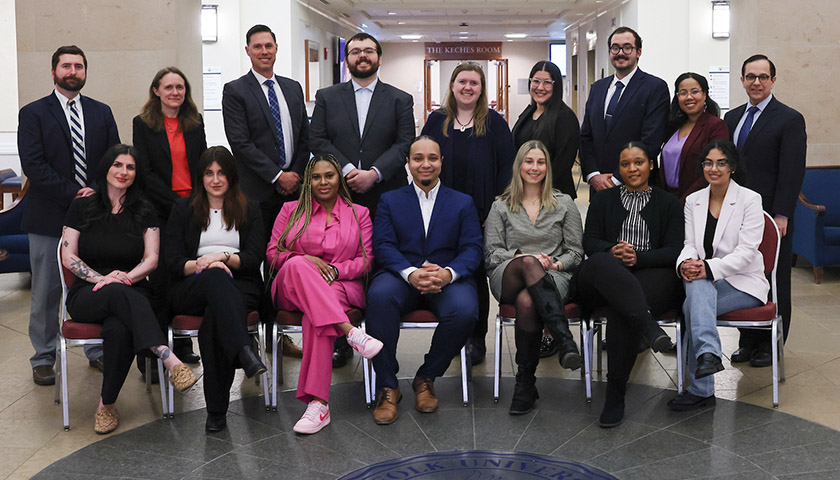It’s the second time in as many years that Bloomberg named Suffolk Law among its top law school innovators. A year ago, Bloomberg honored Suffolk Law’s Legal Innovation & Technology Concentration in its inaugural top-10 innovators ranking.

In its most recent 2023-24 top innovator accolades, Bloomberg Law spotlights Suffolk Law’s Accelerator to Practice Program (A2P) among pioneering educational programs at 12 law schools that go beyond American Bar Association mandates to prepare students for practice.
Bloomberg also cited Suffolk Law and Brigham Young University Law School as the two top-scoring law schools in the category of “career pathing.” The schools are “going the extra mile to provide students with real-world practical experiences” that better prepare them for bar passage and careers, the publication said. Four programs at three other law schools received honorable mention in the category.
Bloomberg noted that Suffolk’s Accelerator to Practice program participants are provided a stipend to work with small law firms during their 1L summer where they experience what it’s like to be a small firm lawyer. Students work at a small firm during their second year as well. They intern with firm leaders and “look under the hood” of the firm’s business practices “and gain first-hand knowledge of their law practice management approaches, marketing, and other business operations,” Bloomberg wrote, citing Suffolk Law Associate Dean for Experiential Learning Sarah Boonin.
Paving the Way for Future Legal Leaders
Now entering its tenth year, A2P is a one-of-a-kind, comprehensive, three-year course of study and practice that provides students with a broad range of skills needed to run a small firm serving average-income clients. At its core, A2P’s success derives from a unique collaboration of faculty, law school career professionals, legal practice experts, and small firm employers who together provide students with a broad set of competencies. This holistic preparation for small firm practice gives our graduates a competitive advantage in the job market.
Gerald Slater, Dean of Professional & Career Development and an architect of the program described how the team identified the core elements of the program. “We analyzed recent graduate employment data and consulted with successful small firm practitioners and practice management experts. This allowed us to isolate the critical legal, business, and technological skills needed for success in practice, and we embedded those skills into one program. Students graduate from A2P with both classroom and practical training in all of these areas.”
Through the A2P’s novel approach, students learn to serve as student attorneys for real clients in the Law School’s in-house clinic and operate a fully functioning legal business. While advocating on behalf of clients facing housing discrimination, Accelerator students also create the structures that keep the school’s in-house firm running, from marketing plans and billing models to high-tech case management and intake systems.
The specialized legal practice and technology training, in courses like Legal Technology for Small Firm Practice and Advanced Practice Skills, allows program graduates to help address a critical problem in the U.S.—the unmet need for affordable legal services accessible to moderate and low-income people facing life-altering legal problems. A2P graduates have the skills to deliver legal services better, cheaper, and faster—to a broader swath of the public.
The curriculum lays the foundation for students to succeed on the NextGen bar exam, which is more focused on skills, and to navigate the unique challenges of working in a small firm, Bloomberg said.
Flipping the model
Professor James Matthews, the program’s faculty director, notes that stumbling blocks come quickly for new lawyers working in small firms or solo practices, including difficulties with marketing, networking, finding customers, and hiring staff.
Most entrepreneurial lawyers who launch their own firms have to solve these problems through trial and error. A2P classes don’t shy away from those challenges, Matthews notes. “Our goal was to flip the model and provide this instruction and training during law school, so our students hit the ground running.”
“Their practical knowledge gives them a ‘leg up’ in the job market,” notes PCD Assistant Dean Brian Vaughn Martel, the dedicated career advisor for all A2P students and graduates. “Employers are eager to train and hire our A2P students, and after completing the program the graduates have enjoyed exceptionally high employment outcomes."
Changing clients’ lives
Since June 2015, Accelerator Practice students and faculty have responded to more than 500 requests for legal assistance and recovered more than $300,000 in compensation and rent waivers for clients. The team has helped scores of families stay in their homes; ensured families live in sanitary and safe conditions; and held landlords and brokers responsible for discrimination.
Building smart mobile apps
Accelerator students have also partnered with Suffolk Law’s nationally leading Legal Innovation and Technology (LIT) Lab to develop online tools and apps that improve client service.
Ana Morrissette, who graduated from the Accelerator in 2023, created an app to help low-income housing voucher recipients track apartment searches. The shortage of rental units, combined with discrimination against voucher holders means that some renters with vouchers have to apply to dozens of apartments. If they don’t secure an apartment within the allotted time, they risk losing their housing subsidies.
Morrissette, now an associate at McEvoy & Stuntz LLC, designed an app to help prospective tenants easily track their rental applications and rejections—with a few taps on their phone. The tool allows them to demonstrate a good-faith housing search and apply for extensions.



